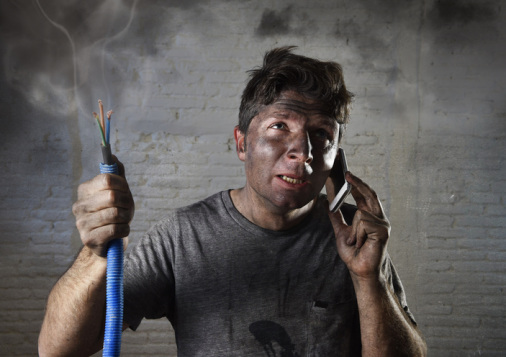DIY Disaster: Brits take to social media for home-improvement advice, rather than trusted sources

- Two-fifths (41%) of Brits who have undertaken DIY projects have gone on to cause accidental damage to their property.
- Over a fifth (22%) of Brits report that they’ve spent more money fixing DIY disasters since the pandemic began.
- To help people overcome DIY Disasters, MORE THAN is providing top-tips for those carrying out home-improvements.
Brits are being encouraged to turn to trusted sources for advice when taking on DIY projects, as new research from home insurer MORE THAN reveals how the rise in social media tutorials and a tendency to 'paper over the cracks' is resulting in higher long-term costs.
According to MORE THAN’s new study of over 2,000 Brits, almost three quarters (74%) have embarked on a DIY project at some point. And, with the average amounts spent on DIY projects rising 8.8% compared to before the pandemic, many are turning to new, more cost-effective ways to improve their home. In fact, Brits are now more than twice as likely to undertake a DIY project themselves rather than hiring experts or tradespeople (43% v 20%), citing cost as the main reason for doing so.
Meanwhile, almost half (45%) of respondents report scrolling social media platforms such as Instagram, Twitter, YouTube and TikTok for their DIY instructions, with just over three in ten (31%) saying that they call on family and friends for advice. According to the research, those aged 16-24 are almost three times more likely to turn to TikTok compared to the average person (30% vs 11%).
At the same time, three in ten (30%) have experienced a DIY project going wrong, rising to 51% amongst 16 – 24-year-olds, with nearly a quarter of respondents saying that they’re having to shell out more money as a result.
Catherine Marsh, Home Strategy and Performance Director at MORE THAN, comments: “Spring is a popular time to undertake home improvements, but it can be easy to make mistakes – from spilling paint to mistakenly drilling holes in pipes. For those considering carrying out DIY, it’s vital to take precautions to avoid any unnecessary accidents. To support DIY enthusiasts, especially those seeking advice and instructions from social media, we’re sharing tips that can help people avoid potential mishaps and provide greater peace of mind.”
"It is also important to note that if any work is being carried out to your home that is not considered as routine repair, maintenance or decoration, you may need to inform your insurer as part of the terms and conditions of your policy.”
MORE THAN’s top tips on how to best avoid DIY mishaps:
- Consider hiring an expert for tasks you’re less confident with – if you’re planning a DIY task that you’ve never done before or have little experience in, there’s a higher chance of something going wrong, potentially causing damage. It may be safer to call in an expert tradesperson instead.
- Minimise personal risk – finding ways to reduce risk of injury is important. For any jobs involving electrics or plumbing, hiring an expert rather than trying to do it yourself is advisable. Furthermore, there are some jobs that only certified electricians are allowed to do due to the risk of electrocution. Avoid working alone when using a ladder or if heights are involved, so you have someone to watch out for you and keep you steady.
- Plan ahead – there’s nothing worse than getting halfway through a DIY project and realising you’ve been too ambitious with your plans or have overshot your budget. Be sure to itemise everything you need before you get started, outlining costs and where best to buy from. Once done, set out a clear timeline so you know what needs to be done, when.
- Triple-check your measurements – any mistakes in your measurements can end up as a DIY disaster and might even ruin your project completely. That is why it is imperative that you measure everything accurately, then check it twice and even a third time to be safe. Don’t forget to use a trusted pencil so you don’t forget the placement.
- Protect your home – DIY projects may involve materials that will stain, dirty or ruin areas of your home. Make sure that you wrap and store any items of value before you start a project to avoid any accidental damage to them.
- Check your insurance cover – it can be easy to make mistakes while carrying out DIY, whether it’s paint spilled on the carpet or knocking items over. It’s worth checking your insurance cover to make sure you have something to fall back on if anything does go wrong. Accidental damage cover isn’t always included as standard, so it is worth checking if you have this and, if in doubt, speak with your insurer.
DIY disaster stories
With nearly a third (29%) of Brits admitting to ‘papering over the cracks’ when it comes to home improvements, it’s no surprise that some jobs turn out more costly in the long run. Here are a few examples from the research findings:
- “It was the first day in our new house in Suffolk. Within 20 minutes of our arrival, my husband hammered a nail through a central heating pipe in the roof joists. He held his finger over the burst while I ran about outside like a headless chicken trying to find a local plumber. Even then, all was not right. We sat at the dining table eating our meal when we noticed that a large drop of water hung from the bottom of the 'rise and fall' light. It fell onto the table and another formed. Soon it was a trickle and then a stream. It was a Sunday, of course, so we turned all the electrics off and sat in the dark until the next day when the search for another plumber began again. Fortunately, this one did a proper job.”
- “Someone we know started building our utility room and it went hopelessly wrong, not enough materials ordered, dug down too far (i.e. to the water table) and we had to get in an expert builder to fix it all.”
- “I tried to fix a hole in an internal wall with plaster and a chunk of plaster fell off down to the brick. The whole wall then had to be replastered.”
If any work is to be done on your home which is not routine repair, or maintenance of decoration, you may need to inform your insurer as part of the terms and conditions of your policy.
Authored by RSA
About RSA
With a 300-year heritage, RSA is one of the world’s leading multinational insurance groups.
Today, RSA employ around 23,000 people, serving 17 million customers in around 140 countries. While RSA's origins lie in London, RSA is a global company with businesses in both mature and emerging markets. RSA have major operations in the UK, Ireland, Scandinavia, Central and Eastern Europe, Canada, Asia, the Middle East and Latin America. youTalk-insurance sharing insurance news and video.

